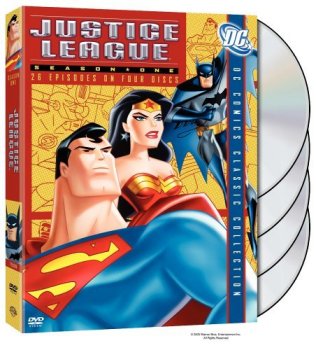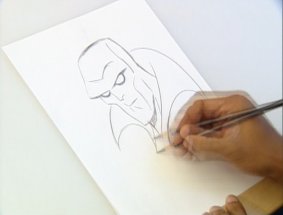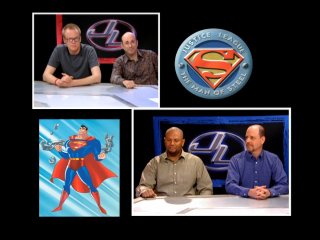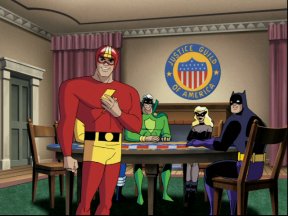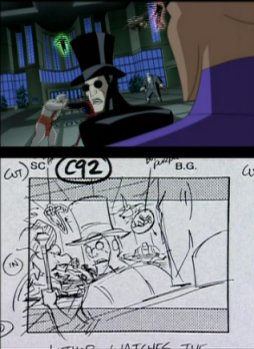Justice
League:
Season One
As we grow near
the close of Justice League Unlimited, Warner Brothers
starts doing right by the show with a beautiful First Season
package. Yes, they'd released episodes in drips and drabs
before, but those packages seemed more brightly colored
come-ons for kids. This four-disc set is definitely for
the fans.
Of course, the
kids are going to get into it, too. As Bruce Timm notes,
despite the production team's intent not to do Superfriends,
there's no getting around the fact that this is Superfriends,
only much, much cooler.
Something deep
within the Fanboy DNA drives us toward loving our team-ups.
It's a headache for producers and storytellers sometimes,
but the results - well, judge for yourself.
Looking over
this first season, it's amazing how assured the show was
right out of the gate. Sure, the production team had toyed
with other characters from the DCU in the several Batman
series and Superman: The Animated Series. Somehow,
though, they hit the right balance that could enthrall kids
and thrill old fans.
In one of the
disc extras, Producers Bruce Timm and James Tucker reveal
that they almost struck a different tone. Initially planning
on pitching Justice League to Kids!WB, they wanted
to appeal to a younger crowd. Never before seen by the public
(allegedly), this "First Mission" included Robin, Impulse
and a teen female version of Cyborg.
Ultimately,
Timm and his team didn't need it. A phone call was all it
took to sell the show we know and love to the Cartoon Network.
Some of the character designs have altered, but it's still
a nice slice of what might have been.
The development
of the character designs gets a close-up look on a featurette,
which Timm narrates. If you watch all of the extras, you
may notice interesting character design changes in Timm
himself; there's long-haired Timm with no glasses, shorn
Timm with glasses and evil twin Timm with a goatee. This
man's ready for his own action figure line. Nowhere, however,
does he appear as the slightly confused Timm we see at conventions
when we approach claiming he knows us.
Despite the
popular misconception that Fanboy Planet is guilty of fomenting,
Justice League is not by any means a one-man show.
On the second disc, moderator Jason Hillhouse leads a roundtable
discussion with several key creators, including Tucker,
Rich Fogel and Dan Riba.
The other key
creator from the first season, Glen Murakami, sits that
discussion out, but does show up in commentary, particularly
enthusiastic for the second part of "The Savage Time," the
episode that sends the Justice League into the battlefields
of World War II while fighting Vandal Savage.
Episodes like
that prove the genuine affection and deep knowledge the
creative team has for the original comics. "The Savage Time"
also brings in the Blackhawks, Sgt. Rock and Easy Company,
as well as finds a way to honor the original legacy of Wonder
Woman's longtime comics boyfriend Steve Trevor. But this
set also includes episodes dealing with the Green Lantern
Corps, Aquaman, Metamorpho, The Demon and a thinly disguised
Justice Society of America.
That latter
appearance caused a stir among fans at the time, but listening
to the commentary really brings it into focus. The story
has a dark tinge that belies its sunny fifties appearance,
and DC really didn't want the JSA to suffer like that. Besides,
it worked out, because now many JSA members have appeared
in Justice League Unlimited.
"Legends," the
Justice Guild two-parter, also underscores the artistic
facility of the show. Though the same team had done a riff
on Batman artist Dick Sprang in "Legends of the Dark Knight"
in The New Batman Adventures , they really went to
town here utilizing that Golden Age style, even making a
villain look like Bob Hope, whose fictional adventures DC
published for well over a decade. , they really went to
town here utilizing that Golden Age style, even making a
villain look like Bob Hope, whose fictional adventures DC
published for well over a decade.
Other episodes
stretch to encompass the style of Ramona Fradon ("Metamorphosis")
and Jack Kirby ("A Knight of Shadows") while still maintaining
its own distinctive look. If they could have used Blue Beetle,
there's no doubt he would have still looked like Ditko within
the animated universe.
Still in the
more educational mode, the set also includes a featurette
on storyboarding. What Tucker fails to mention is that that's
where he got his start with this team, though he does emphasize
that storytelling skills are key.
After watching
these discs, you'll agree that these men are masters of
storytelling. Though many key elements do not pay off until
the next season (I'm ready for that set, Warner Brothers),
Timm reveals that they had the rough arcs planned out from
the very beginning, allowing for a subtle building of emotional
connections among characters.
Watch for the
first signs of Hawkgirl bonding with Green Lantern. Notice
the seeds of Wonder Woman's attraction for Batman, suggested
to Timm by Paul Levitz, Editor-in-chief at DC Comics. (That
attraction actually ran parallel to events in JLA,
the then-current incarnation of the team in print.)
Best of all,
these episodes hold up on repeated viewings. They're fun,
they're occasionally thoughtful, and often more intelligent
than most people would expect from what was once intended
for Saturday morning.
If the set has
a flaw, it's that the episodes aren't presented in wide-screen
format. However, at least in the first season, Cartoon Network
ran the shows both ways, so the letterboxing really only
cut off some of the picture at the top and bottom. Timm
once admitted at Comic-Con that letterboxing was a pretentious
move.
Still, it seemed
to give the show the respect it deserved. Watching Justice
League at its best is like watching your favorite movie
from when you were a kid, and finding out it really is
as good as you remember.
Justice League - Season One (DC Comics Classic Collection)
|
